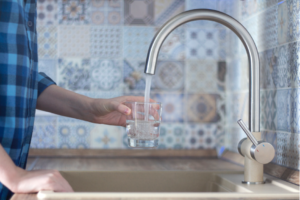
Below, we’re going to get into the basics of water softening in Burr Ridge, Illinois, helping you to understand the most important aspects of it.
The Benefits of Water Softening
There are quite a few benefits to softening your water. We’ll discuss the most prominent benefits in detail below.
Reduces Mineral Buildup
As water runs through pipes and appliances, the minerals contained within that water cling to the surfaces. Over time, this clinging can lead to full-on buildup, impairing the pipe or appliance and leading to reduced functionality.
As such, by removing the calcium and magnesium that exist within hard water, you can greatly reduce the amount of mineral buildup that occurs. Yes, there will still be some other minerals present, but the biggest culprits will be eliminated.
Helps Skin and Hair
The fact of the matter is that hard water is tough on the skin and hair. Because it contains calcium and magnesium, it dries them out, resulting in rashes, split ends, acne, fraying, and more.
Fortunately, by softening your water, you can do away with the vast majority of these problems. The water softener will remove calcium and magnesium from your water, preventing these minerals from blocking skin pores, and allowing the body to secrete natural and vital oils. This purifies the skin and hair, allowing them to thrive.
Promotes Soap Suds
One of the most common problems you’ll encounter with hard water is a lack of soap suds. Because there are excess amounts of calcium and magnesium in hard water, they impair the chemical reaction between soap and water, thus reducing the amount of soap suds that are allowed to form.
A water softener will remove all of the calcium and magnesium from your water, allowing the soap and water chemical reaction to occur easily. Ample soap suds will be the result, and they will allow you to wash your hands and clean dishes more easily.
How Does a Water Softener Work?
Now, you might be wondering: how exactly do water softeners work? They operate through a process known as ion-exchange. Ion-exchange is a process wherein one particular type of ion is swapped out in exchange for another type of ion. In the case of water softeners, calcium and magnesium ions are swapped out in exchange for sodium ions.
To facilitate this, water softeners make use of a few key ingredients. One of these is resin, which holds onto the sodium ions until calcium and magnesium ions arrive. Once they do, they exchange, putting sodium ions in the purified water, and taking calcium and magnesium out of it.
Another ingredient needed to make a water softener function is softener salt. This salt comes in big chunks and is responsible for adding additional sodium to the resin contained within the softener. Generally speaking, you’ll need to add a bag of softener salt to the system every month or so.
As long as you add this salt, you should be good to go. The softener should eliminate calcium and magnesium in your water, rendering it soft for the foreseeable future.
Need Water Softening Services in Burr Ridge?
Now that you know a little something about water softening, you might be interested in installing a water softener in your home. If so, and if you are looking to install a water softening in Burr Ridge, we here at DuPage Water Conditioning are the company to call.
We have installed water softeners in a number of homes throughout the Burr Ridge area. Regardless of your needs, we are here to help.
Contact us today to schedule an appointment!
